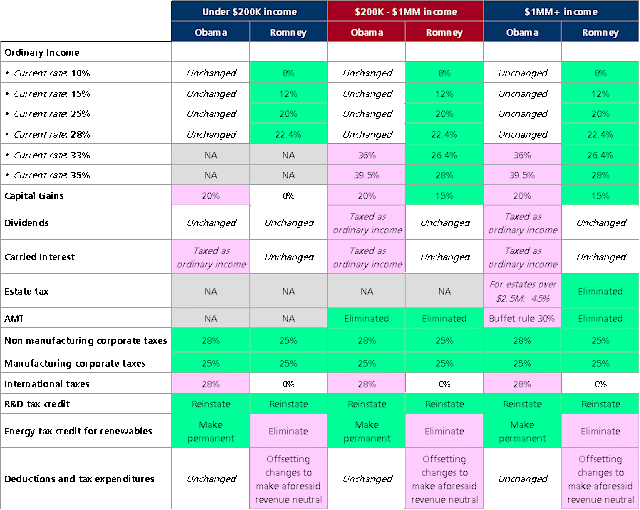Mitt Romney says he will create 12 million new jobs. This is an excellent and very detailed analysis of his plan.
For those who don't want to wade through it, here's a summary:
For those who don't want to wade through it, here's a summary:
- ~2.7 million to ~3.6 million jobs he takes credit for are expected to be created over the next eight years, largely because of trends and policies already adopted — including tougher fuel efficiency standards that Romney has criticized and suggested he would reverse.
- ~2MM jobs comes from a 2011 International Trade Commission report, which estimated that there could be a gain of 2.1 million jobs if China stopped infringing on U.S. intellectual property rights, but it is unclear, to say the least, whether Romney's policies would seriously dent this.
- 7 million jobs would be created from Romney’s tax plan is a 10-year number, derived from a study written by John W. Diamond, a professor at Rice University. John Diamond assumes that all corporate deductions would be eliminated and most individual deductions too, which, as I have explained elsewhere, would actually mean a net tax increase on individuals (and John Diamond actually assumes the same). Moreover, this figure assumes that more people will be looking for work, which does not necessarily mean they'll find work.
So, Romney can at best take credit for about ~2.8M jobs over 4 years.
Now, here comes the most curious bit. Net net, under Romney's plan individual taxes will increase. Also, tax burden will shift from richer to poorer people, and since the marginal propensity to spend of poorer people is less, this will actually reduce consumer spending and create a slight drag on the economy. So, where is all this purported growth coming from. Well, the answer is that most of it comes from the reduction in effective tax rates for Corporations. And, the most interesting piece is that while Romney reduces his rates to 25%, Obama reduces his to 28% (with a penalty for multinationals and 25% for manufacturers). Also, Obama retains a lot of the tax expenditures on companies. So, net net, while Obama's proposed corporate tax rates are higher, they may not be all that much higher. Nothing in this analysis compares the net jobs difference to Obama's plan.
My guess is that all said and done, the jobs numbers between the two are likely not going to be too different.
















